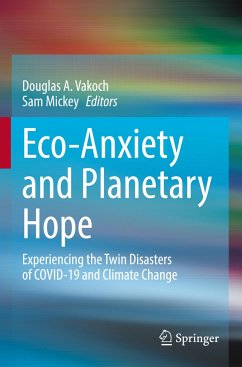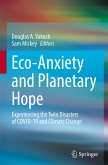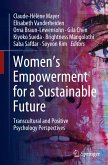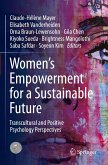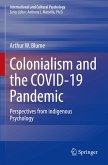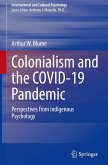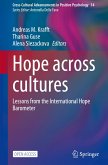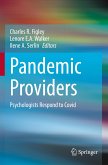Eco-Anxiety and Planetary Hope
Experiencing the Twin Disasters of COVID-19 and Climate Change
Herausgegeben:Vakoch, Douglas A.; Mickey, Sam
Eco-Anxiety and Planetary Hope
Experiencing the Twin Disasters of COVID-19 and Climate Change
Herausgegeben:Vakoch, Douglas A.; Mickey, Sam
- Broschiertes Buch
- Merkliste
- Auf die Merkliste
- Bewerten Bewerten
- Teilen
- Produkt teilen
- Produkterinnerung
- Produkterinnerung
This timely volume examines the conflict between human individual life and larger forces that are not controllable. Drawing on recent literature in phenomenological and existential psychology it calls for a more nuanced understanding of the human predicament. Focusing on the co-occurring crises of climate change and the COVID-19 epidemic, it explores the nature of widespread anxiety and the long-term human consequences. It calls for an expansion of current research that would include the arts and humanities for critical insights into how this essential conflict between humanity and nature may be reconciled.…mehr
Andere Kunden interessierten sich auch für
![Eco-Anxiety and Planetary Hope Eco-Anxiety and Planetary Hope]() Eco-Anxiety and Planetary Hope75,99 €
Eco-Anxiety and Planetary Hope75,99 €![Women's Empowerment for a Sustainable Future Women's Empowerment for a Sustainable Future]() Women's Empowerment for a Sustainable Future208,99 €
Women's Empowerment for a Sustainable Future208,99 €![Women's Empowerment for a Sustainable Future Women's Empowerment for a Sustainable Future]() Women's Empowerment for a Sustainable Future209,99 €
Women's Empowerment for a Sustainable Future209,99 €![Colonialism and the COVID-19 Pandemic Colonialism and the COVID-19 Pandemic]() Arthur W. BlumeColonialism and the COVID-19 Pandemic97,99 €
Arthur W. BlumeColonialism and the COVID-19 Pandemic97,99 €![Colonialism and the COVID-19 Pandemic Colonialism and the COVID-19 Pandemic]() Arthur W. BlumeColonialism and the COVID-19 Pandemic97,99 €
Arthur W. BlumeColonialism and the COVID-19 Pandemic97,99 €![Hope across cultures Hope across cultures]() Hope across cultures97,99 €
Hope across cultures97,99 €![Pandemic Providers Pandemic Providers]() Pandemic Providers90,99 €
Pandemic Providers90,99 €-
-
-
This timely volume examines the conflict between human individual life and larger forces that are not controllable. Drawing on recent literature in phenomenological and existential psychology it calls for a more nuanced understanding of the human predicament. Focusing on the co-occurring crises of climate change and the COVID-19 epidemic, it explores the nature of widespread anxiety and the long-term human consequences. It calls for an expansion of current research that would include the arts and humanities for critical insights into how this essential conflict between humanity and nature may be reconciled.
Produktdetails
- Produktdetails
- Verlag: Springer / Springer International Publishing / Springer, Berlin
- Artikelnr. des Verlages: 978-3-031-08433-1
- 1st edition 2022
- Seitenzahl: 172
- Erscheinungstermin: 17. September 2023
- Englisch
- Abmessung: 235mm x 155mm x 10mm
- Gewicht: 271g
- ISBN-13: 9783031084331
- ISBN-10: 3031084330
- Artikelnr.: 68633828
- Herstellerkennzeichnung Die Herstellerinformationen sind derzeit nicht verfügbar.
- Verlag: Springer / Springer International Publishing / Springer, Berlin
- Artikelnr. des Verlages: 978-3-031-08433-1
- 1st edition 2022
- Seitenzahl: 172
- Erscheinungstermin: 17. September 2023
- Englisch
- Abmessung: 235mm x 155mm x 10mm
- Gewicht: 271g
- ISBN-13: 9783031084331
- ISBN-10: 3031084330
- Artikelnr.: 68633828
- Herstellerkennzeichnung Die Herstellerinformationen sind derzeit nicht verfügbar.
Douglas A. Vakoch, PhD, is president of METI International and professor emeritus of clinical psychology at the California Institute of Integral Studies. He has edited or co-edited more than twenty books covering environmental studies, psychology, and the search for life beyond Earth, including Ecopsychology, Phenomenology, and the Environment: The Experience of Nature (Springer, 2014), The Routledge Handbook of Ecofeminism and Literature (Routledge, 2023), and Eco-Anxiety and Pandemic Distress: Psychological Perspectives on Resilience and Interconnectedness (Oxford University Press, 2023). Dr. Vakoch is the founding editor of Springer's Space and Society book series, and he serves as the general editor of Lexington Books' Ecocritical Theory and Practice book series. His work has been featured in such publications as The New York Times, The Economist, Nature, and Science, and he has been interviewed for numerous radio and television programs, including those broadcast on the BBC, The Science Channel, and The Discovery Channel. He is also director of Green Psychotherapy, PC, a private practice serving individuals who are experiencing eco-anxiety. Sam Mickey, PhD, is an Adjunct Professor in the Theology and Religious Studies department and the Environmental Studies program at the University of San Francisco. He is also a Research Associate for the Yale Forum on Religion and Ecology. He is the author of several books on ecological thought, including Coexistentialism and the Unbearable Intimacy of Ecological Emergency (Lexington Books, 2016) and On the Verge of a Planetary Civilization: A Philosophy of Integral Ecology (Rowman & Littlefield, 2014). With Mary Evelyn Tucker and Grim, he co-edited Living Earth Community: Multiple Ways of Being and Knowing (Open Book Publishers, 2020). He also edited Integrating Ecology and Justice in a Changing Climate (University of San Francisco Press,2020), and he has co-edited several volumes with Douglas Vakoch, Eco-Anxiety and Pandemic Distress: Psychological Perspectives on Resilience and Interconnectedness (Oxford University Press, 2022) and Literature and Ecofeminism: Intersectional and International Voices (Routledge, 2018). Dr. Mickey is the Reviews Editor for the journal Worldviews: Global Religions, Culture, and Ecology.
Part I. The Experience of Eco-Anxiety.- Chapter 1. Not to Be Unworthy of the Event: Thinking through Pandemics with Merleau-Ponty and Deleuze.- Chapter 2. We Breathe, Therefore We Are: The Gasp of Life.- Chapter 3. Atmospheres of Anxiety: Doing Nothing in an Ecological Emergency.- Chapter 4. Anxiety and the Re-Figuration of Human Action: Living in a Crisis-Shaped Present.- Chapter 5. Authentic Compassion in the Wake of Coronavirus: A Nietzschean Climate Ethics.- Part II. Beyond Birth, Existence, and Environment.- Chapter 6. Birth Strike: Holding the Tension between Existence and Non-Existence.- Chapter 7. Stillbirth Grief, Eco-Grief & Corona Grief: Reflections on Denialism.- Chapter 8. Saving the Other, Saving the Self: Exploring Children's and Young People's Feelings about the Coronavirus, Climate, and Biodiversity Crises.- Chapter 9. Participating in the Wound of the World: A Matrixial Rethinking of Eco-Anxiety.- Chapter 10. From Oppression to Love as Mother Earth Joins the Time's Upand #MeToo Movements.- Part III. Eco-Poetry and Creative Writing.- Chapter 11. Ecoprogamming the Vulnerable Bodies.- Chapter 12. Anxiety in Isolation: Anointing with Ecocentrism.- Chapter 13. "Narrative Medicine" in the Age of COVID-19: The Power of Creative Writing to Reimagine Environmental Crisis.- Chapter 14. Solastalgia and Soul Suffrage: A Narrative Eco-Poem.
Part I. The Experience of Eco-Anxiety.- Chapter 1. Not to Be Unworthy of the Event: Thinking through Pandemics with Merleau-Ponty and Deleuze.- Chapter 2. We Breathe, Therefore We Are: The Gasp of Life.- Chapter 3. Atmospheres of Anxiety: Doing Nothing in an Ecological Emergency.- Chapter 4. Anxiety and the Re-Figuration of Human Action: Living in a Crisis-Shaped Present.- Chapter 5. Authentic Compassion in the Wake of Coronavirus: A Nietzschean Climate Ethics.- Part II. Beyond Birth, Existence, and Environment.- Chapter 6. Birth Strike: Holding the Tension between Existence and Non-Existence.- Chapter 7. Stillbirth Grief, Eco-Grief & Corona Grief: Reflections on Denialism.- Chapter 8. Saving the Other, Saving the Self: Exploring Children's and Young People's Feelings about the Coronavirus, Climate, and Biodiversity Crises.- Chapter 9. Participating in the Wound of the World: A Matrixial Rethinking of Eco-Anxiety.- Chapter 10. From Oppression to Love as Mother Earth Joins the Time's Upand #MeToo Movements.- Part III. Eco-Poetry and Creative Writing.- Chapter 11. Ecoprogamming the Vulnerable Bodies.- Chapter 12. Anxiety in Isolation: Anointing with Ecocentrism.- Chapter 13. "Narrative Medicine" in the Age of COVID-19: The Power of Creative Writing to Reimagine Environmental Crisis.- Chapter 14. Solastalgia and Soul Suffrage: A Narrative Eco-Poem.

